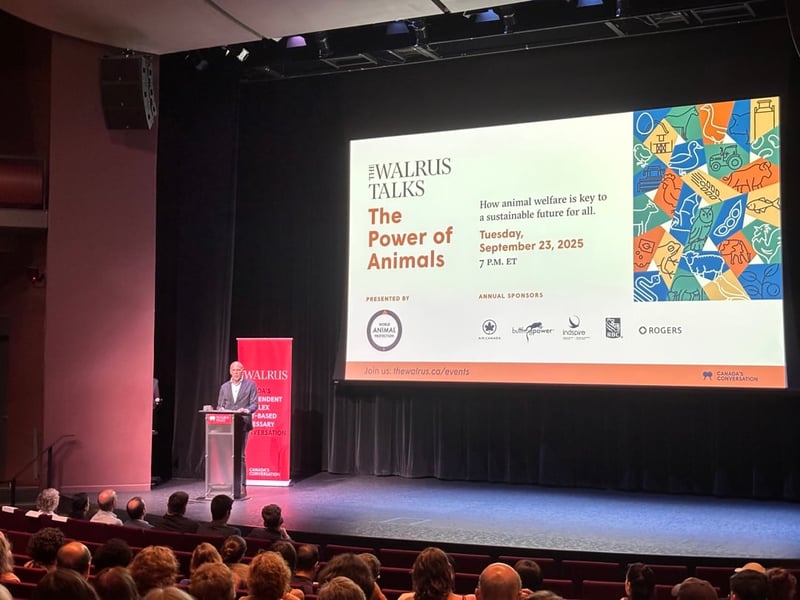
Walrus Talks recap: Exploring the Power of Animals
Blog
Animals shape our lives, cultures and ecosystems in countless ways. The Walrus, a fact-based media organization dubbed “Canada’s conversation” holds a series of events that bring together thought leaders to discuss ideas shaping our world. At The Walrus Talks, seven experts explored the connections between humans, animals and the natural world, showing why we need a kinder, healthier, more sustainable future.
The Walrus Talks: The Power of Animals supported by World Animal Protection, took place on September 23, 2025, at the Isabel Bader Theatre in Toronto, Ontario. The event highlighted how animal welfare is central to a sustainable future, exploring connections between ethical treatment, human health and environmental conservation. Speakers shared how improving farmed animal care can reduce antibiotic resistance, protect ecosystems, strengthen local food systems and create benefits for communities, animals and the planet. When animals thrive, we all do.
Industrial agriculture vs local food systems
Dr. Alison Blay-Palmer, UNESCO Chair on Food; Biodiversity and Sustainability Studies, Wilfrid Laurier University
Dr. Alison Blay-Palmer explained how industrial agriculture harms ecosystems, drives climate change and undermines local communities. She contrasted this with local, biodiverse farms that nourish communities, protect ecosystems and support livelihoods. She urged supporters to back food systems that reduce fossil fuel use, protect biodiversity and ensure everyone has access to healthy, sustainable food.
Plant-based diets reduce chronic disease
Dr. Zahra Kassam, Staff Radiation Oncologist, Stronach Regional Cancer Centre; Assistant Professor, Department of Radiation Oncology, University of Toronto
Dr. Zahra Kassam highlighted how plant-based diets can prevent and help manage chronic diseases like heart disease, diabetes and cancer. She also showed how industrial animal agriculture harms people, animals and the planet, driving antibiotic resistance, environmental damage and social inequalities. She encouraged everyone to eat more plants to support healthier people, communities and ecosystems.
Antibiotics are overused in animals
Dr. Scott Weese, Professor, Ontario Veterinary College, University of Guelph
Dr. Scott Weese explained the risks of overusing antibiotics in animals, which contributes to antibiotic resistance in humans. He stressed that antibiotics should only be used when necessary and that health depends on good animal care, nutrition and sanitation. Supporting responsible farming practices can protect both animals and people.
Environmental, human and animal health are all the same
Nathaniel Erskine-Smith, MP, Beaches – East York
MP Nathaniel Erskine-Smith emphasized the interconnectedness of animal welfare, human health and environmental health – what’s known as “One Health.” He highlighted progress in Canada on animal protections, including bans on shark finning, cosmetic testing and improvements to the criminal code, while noting ongoing gaps like horse export bans and fully operationalizing the Canada Food Guide. He stressed that systemic change, especially in food systems, requires political action, innovative approaches like cellular agriculture and stronger government procurement of healthy, sustainable foods.
The law of enough
Dr. Joseph LeBlanc, Associate VP, Equity and Inclusion and Assistant Professor, Indigenous Health at Northern Ontario School of Medicine University; Vice-President, Social Accountability, Association of Faculties of Medicine Canada
Dr. Joseph LeBlanc reflected on the lessons we can learn from animals, particularly the principle of “enough” – taking only what is needed. He noted that humans have disrupted natural systems, causing crises like food insecurity and environmental harm. Dr. LeBlanc encouraged community-based solutions, reciprocity and using our abilities to care for the land and each other.
Food systems need a new choice architecture
Nital Jethalal, Executive Director, Institute for Future Food Systems
Nital Jethalal emphasized the value of animals alive and the inefficiency of industrial animal agriculture, which drives health, environmental and social crises. He highlighted how plant-based diets are healthier, more sustainable and cheaper, but adoption is slowed by industry influence and policy gaps. Coordinated action, reskilling labor and reshaping food choices can help build healthier, fairer and more resilient societies.
One health, one welfare
Tricia Croasdell, Global CEO, World Animal Protection
World Animal Protection Global CEO, Tricia Croasdell spoke about how industrial food systems harm animals, humans and the planet. She emphasized that even small reductions in meat and dairy consumption have major positive impacts, from fewer animals in factory farms to lower emissions and better health. Progress means supporting high-welfare farming, advocating for plant-based options and policies that protect animals and the environment for future generations.
Celebrating the power of animals
The Walrus Talks showed us that animals hold incredible power – not just in nature, but in shaping our health, communities and planet. From teaching us balance and reciprocity to inspiring healthier diets, stronger food systems and more compassionate choices, animals have lessons for every part of our lives.
By recognizing their power and acting to protect them, we can create a world where humans and animals thrive together.